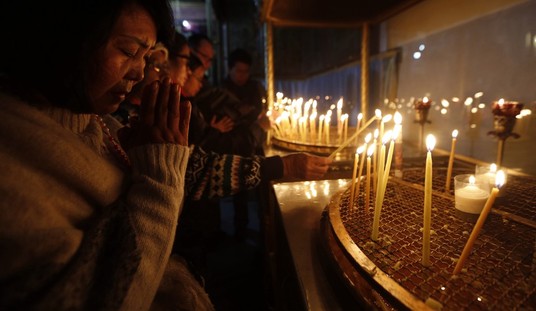Yet another empirical study showing that vouchers work has been added to the pile — but this time the study is in Washington D.C., where the politics of vouchers are especially complicated. The positive results for the program are an embarrassment to Congress, which just voted to end the program without waiting for the study results to come out (oops!), and to the Obama administration, which has been desperately hoping to dodge the issue.
But those who should be most embarrassed by this study actually have nothing to fear from it — and thereby hangs a tale about a little-noticed provision in the law that makes D.C. vouchers uniquely frustrating.
These new results are actually the third year’s worth of data from an ongoing evaluation of the D.C. program. As sometimes happens with voucher research, in the study’s first two years the positive results for vouchers did not quite reach full statistical certainty. Back then, voucher opponents made a big deal out of this, claiming it meant the voucher program wasn’t working. But if you were reading Pajamas Media, you knew better. And now, as with previous studies, additional data have helped the positive results for vouchers reach statistical certainty.
Question one: Since voucher opponents made such a big deal out of this ongoing study back when its results were not yet statistically certain, will they continue to respect the study now that its positive results are certain? The question answers itself.
Question two: Will voucher opponents be made to pay any price for praising this study when its results could be misleadingly twisted to suit their preferences, then ignoring it now that they no longer can be? That question also answers itself.
These new findings come on the heels of positive empirical findings for Milwaukee vouchers the week before and build on a large body of high-quality previous research consistently finding the same thing. If evidence were going to decide the voucher debate, there wouldn’t be a debate any more.
And in fact, we were repeatedly promised that evidence would decide the debate. The president, his education secretary, the head of the Senate subcommittee overseeing the program, and a host of others all promised that they would evaluate vouchers guided solely by evidence.
But those promises were empty — so empty that the U.S. Department of Education actually sat silently on the study results while Congress debated the voucher program. It knew the results even back in the fall, while the Bush administration was still in charge. But apparently nobody in either the previous or the current administration thought the results were important enough for the public to know them until after it was too late.
Perhaps most frustrating, while voucher advocates have all the empirical evidence on their side in D.C., there is one weapon they don’t have that the advocates of all other voucher programs in the U.S. do. They don’t have a program that can credibly promise to improve performance in the government school monopoly.
Everywhere else in the country, vouchers improve public schools. That’s what the new results in Milwaukee found. That’s what 17 out of the 18 empirical studies on the question (including the new one in Milwaukee) have found — vouchers always improve public schools.
Except in Washington D.C., which is where that 18th study was conducted. In D.C., the voucher program was found to make no difference in public school outcomes.
Why? Because in order to get the program enacted, its sponsors had to design it so that that voucher success poses no systematic competitive threat to the government school monopoly, as it does in every other voucher program. The funding for the vouchers is appropriated separately from public school funding, and when students leave public schools with vouchers, a “hold harmless” clause kicks in and ensures that total public school funding doesn’t go down.
That means, on a per-student basis, the public schools are actually better off financially when students leave. So there’s no market pressure to improve performance and keep students.
That’s why the people who should be most embarrassed by the new study results in D.C., the teachers’ unions and patronage bureaucrats who have done so much to destroy the city’s public schools, aren’t worried. Vouchers, no vouchers — they win either way.
The real resistance to the D.C. voucher program is coming not from the local public schools, who aren’t much affected by the program, but from out-of-town politicians on Capitol Hill. The members of Congress threatening the program don’t care about what happens in D.C., but they do care how the city’s highly visible voucher program affects the issue in their home states.
The rest of the country is watching. If the politicians in Congress prove that they can get away with destroying the lives of 1,700 children while suppressing vital information showing that the program works, all in order to please their home-state unions, that sends a message to fifty statehouses. Conversely, if the word gets out about what’s happening and the program is restored, that sends the opposite message.
The D.C. program would be in danger now even if it didn’t have the unique problem of the “hold harmless” provision. But it wouldn’t be in as much danger, because then its advocates could have pointed to the prospect of improved public schools, but as things are, they can’t.
There’s a lesson here for the voucher movement nationwide. For twenty years, we’ve compromised our best vision of school choice in order to get programs enacted. We’ve accepted programs that are limited to small numbers of children, as in Milwaukee, instead of being open to all. We’ve accepted the “hold harmless” provision in D.C.
And those compromises may have been worth making, since they gave vouchers the opportunity to prove themselves in the real world. And prove themselves they have, as the evidence shows. We wouldn’t have this large body of consistently positive empirical evidence to point to if we didn’t have any voucher programs.
But now, the “demonstration” value of these narrowly limited, compromised programs has pretty much already been realized. Now, we’re starting to really see what people like Milton Friedman always warned about — that limited school choice is much more difficult to sustain in the long term, because it doesn’t produce as many benefits and it doesn’t distribute the benefits as widely. That’s important food for thought as the movement looks at its plans for the coming years.









Join the conversation as a VIP Member